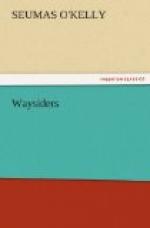The Can with the Diamond Notch
Both Sides of the Pond
The White Goat
The Sick Call
The Shoemaker
The Rector
The Home-Coming
A Wayside Burial
The Gray Lake
The Building
THE CAN WITH THE DIAMOND NOTCH
I
[Illustration: Festus Clasby]
The name stood out in chaste white letters from the black background of the signboard. Indeed the name might be said to spring from the landscape, for this shop jumped from its rural setting with an air of aggression. It was a commercial oasis on a desert of grass. It proclaimed the clash of two civilisations. There were the hills, pitched round it like the galleries of some vast amphitheatre, rising tier upon tier to the blue of the sky. There was the yellow road, fantastic in its frolic down to the valley. And at one of its wayward curves was the shop, the shop of Festus Clasby, a foreign growth upon the landscape, its one long window crowded with sombre merchandise, its air that of established, cob-web respectability.
Inside the shop was Festus Clasby himself, like some great masterpiece in its ancient frame. He was the product of the two civilisations, a charioteer who drove the two fiery steeds of Agricolo and Trade with a hand of authority. He was a man of lands and of shops. His dark face, framed in darker hair and beard, was massive and square. Behind the luxurious growth of hair the rich blood glowed on the clear skin. His chest had breadth, his limbs were great, showing girth at the hips and power at the calves. His eyes were large and dark, smouldering in soft velvety tones. The nose was long, the nostrils expressive of a certain animalism, the mouth looked eloquent. His voice was low, of an agreeable even quality, floating over the boxes and barrels of his shop like a chant. His words never jarred, his views were vaguely comforting, based on accepted conventions, expressed in round, soft, lulling platitudes. His manner was serious, his movements deliberate, the great bulk of the shoulders looming up in unconscious but dramatic poses in the curiously uneven lighting of the shop. His hands gave the impression of slowness and a moderate skill; they could make up a parcel on the counter without leaving ugly laps; they could perform a minor surgical operation on a beast in the fields without degenerating to butchery; and they would always be doing something, even if it were only rolling up a ball of twine. His clothes exuded a faint suggestion of cinnamon, nutmeg and caraway seeds.




